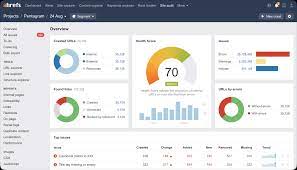
Search Engine Optimization (SEO) is a critical component of any successful digital marketing strategy. It involves various techniques and practices aimed at improving a website’s visibility and ranking on search engine results pages. One key aspect of SEO that often gets overlooked but is crucial to achieving optimal results is site analysis.
SEO site analysis is the process of evaluating and assessing a website’s performance from an SEO perspective. It involves examining various elements of the site, such as content, structure, keywords, backlinks, and technical aspects, to identify strengths, weaknesses, and opportunities for improvement.
Conducting a thorough site analysis provides valuable insights into how well your website is performing in terms of SEO. By identifying areas that need attention or enhancement, you can develop a targeted strategy to optimise your site for better search engine rankings and increased organic traffic.
To perform a comprehensive SEO site analysis, consider the following steps:
In today’s competitive online landscape, conducting regular SEO site analysis is essential for staying ahead of the curve. By understanding how well your website is optimised for search engines and user experience, you can make informed decisions that drive organic traffic growth and improve overall online visibility. Invest time in analysing your site’s performance today to reap the rewards tomorrow.
SEO site analysis is a crucial process in the realm of digital marketing that involves a comprehensive evaluation of a website’s performance from an SEO perspective. It entails scrutinising various elements of the site, such as content quality, technical structure, keyword usage, backlink profile, and overall user experience. By conducting an SEO site analysis, businesses can gain valuable insights into their website’s strengths and weaknesses, identify areas for improvement, and develop targeted strategies to enhance search engine visibility and organic traffic. Ultimately, SEO site analysis serves as a cornerstone for optimising websites to achieve higher rankings on search engine results pages and drive sustainable online growth.
Understanding the importance of SEO site analysis for your website is crucial in achieving online success. By conducting a comprehensive analysis of your site’s SEO performance, you gain valuable insights into areas that require improvement and opportunities for growth. This process helps identify technical issues, assess keyword effectiveness, evaluate content quality, and enhance user experience. Ultimately, SEO site analysis empowers you to create a targeted strategy that optimises your website for better search engine rankings, increased organic traffic, and improved overall online visibility.
SEO site analysis plays a pivotal role in enhancing search engine rankings by providing valuable insights into the performance and optimisation of a website. By conducting a thorough analysis, businesses can identify and rectify technical issues, improve keyword targeting, enhance content quality, and strengthen backlink profiles. These improvements not only make the website more attractive to search engine algorithms but also enhance user experience, leading to higher engagement and retention rates. Ultimately, the data-driven approach of SEO site analysis empowers businesses to implement targeted strategies that align with search engine best practices, thereby boosting visibility, organic traffic, and ultimately improving search engine rankings.
During SEO site analysis, several key elements must be carefully considered to ensure the effectiveness of the evaluation process. These elements include assessing the technical aspects of the website, such as page loading speed, mobile responsiveness, URL structure, meta tags, and schema markup. Additionally, it is crucial to evaluate the quality and relevance of the website’s content, including keyword usage, readability, and overall engagement. Backlink profile analysis to identify both beneficial and harmful links is also essential. User experience metrics like bounce rate, time on page, and conversion rates play a significant role in determining the effectiveness of the site’s design and content. By focusing on these key elements during SEO site analysis, businesses can develop targeted strategies to enhance their online presence and improve search engine rankings.
When it comes to performing SEO site analysis, there are several tools available that can help you assess and optimise your website’s performance. Popular tools such as Google Analytics, Google Search Console, SEMrush, Moz, Ahrefs, and Screaming Frog are commonly used by digital marketers and SEO professionals to gather valuable data and insights about a website’s SEO health. These tools offer features like keyword analysis, backlink monitoring, technical audits, competitor analysis, and performance tracking to help you identify areas for improvement and develop a targeted strategy for enhancing your site’s search engine visibility. By leveraging these tools effectively, you can gain a comprehensive understanding of your website’s SEO standing and make informed decisions to drive organic traffic growth and improve overall online presence.
Regularly conducting SEO site analysis is crucial for maintaining and improving the performance of your website. As search engine algorithms and user behaviours evolve, it is recommended to perform a comprehensive site analysis at least once every quarter or whenever significant changes are made to your website. By monitoring your site’s SEO health on a regular basis, you can identify issues promptly, fine-tune your strategies, and stay ahead of the competition in the dynamic digital landscape. Consistent site analysis allows you to adapt to emerging trends, optimise content for relevant keywords, enhance user experience, and ultimately boost your search engine rankings and organic traffic.
When conducting SEO site analysis, it is crucial to be aware of common mistakes that can hinder the effectiveness of the process. One key mistake to avoid is overlooking technical aspects such as website speed, mobile-friendliness, and crawlability. Ignoring these factors can negatively impact user experience and search engine rankings. Another common mistake is failing to conduct a thorough keyword analysis and optimise content accordingly. Without targeting the right keywords, your website may not attract the desired organic traffic. Additionally, neglecting to monitor and address issues with backlinks can harm your site’s credibility and authority in the eyes of search engines. By avoiding these pitfalls and maintaining a comprehensive approach to SEO site analysis, you can maximise the impact of your efforts and achieve better results in improving your online presence.